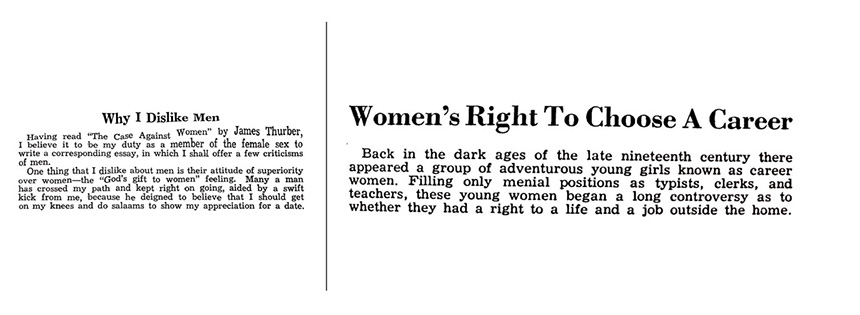The Politics of Gender in Mid-Century Composition Student Writing at Miami University
Assignment
In order to help students to contextualize the sexist institutional structures in which Hughey’s writing was embedded, I assigned them an excerpt about “Women in Student Culture” from Ellison’s Miami University, 1809-2009: Bicentennial Perspectives.
In addition to reading Hughey’s “Why I Dislike Men,” students also read another 1949 male student’s response to Thurber entitled “My Case Against the Women of Miami.” In an act of archival serendipity, the scan for the latter essay also included a one-paragraph reflective essay by a young woman, with the title “Am I a Human?”
In order to offer another example of feminist composition student writing from the era, I assigned another 1954 student essay entitled “Women’s Right To Choose a Career.”
Finally, in order to help students contextualize how the composition curriculum may have influenced the student writing we were analyzing, I also assigned students to read the standard syllabus for English 100 (First Year Composition) from 1950-51.
To prepare for discussion, I asked students to write a short reading response prior to class in which they analyzed at least two quotes from two of the readings. Some guiding questions I provided for the response include:
- Discuss how a key concept or term in the quote might be applied to your own experiences as a Miami student.
- Consider how the quote might complicate your understanding of the history (and perhaps also the present) of Miami university.
- Analyze how audiences might have reacted to the quote at the time versus how they might see it now. (Consider who the writer may been trying to address with their writing and how that audience may have influenced them).
- Ask questions about aspects of the quote you find confusing and try your best to start answering them (through context clues in the text, or through online research).
- Relate the reading to your own experiences as a Miami student.
In opening the discussion, I offered a brief mini-lecture about common ways of conceptualizing the history of composition instruction in the 1950s as a primarily conservative institution focused primarily on enforcing norms of grammatical correctness as a form of institutional gatekeeping. I noted, however, that very few historians had looked at composition student writing from the period as student papers are so rarely archived, so most of these historical claims rely on professor-authored documents such as textbooks, scholarly articles, and syllabi. I told students that we here at Miami are unusual in having a robust archive of student writing from this period, and I was excited to share it with them and see if we might be able to complicate some of the common wisdom about composition in the era.
I began the discussion by asking students to get into small groups, share the quotes they had written about in their responses, and then use that conversation to generate a question or an insight that the larger group might discuss.
We then had a lively question that delved into ways women composition students both resisted at at times reinforced sexist, heteronormative scripts in their writing; about how many of Hughey’s critiques still applied to the behavior of cishet men on campus today; about how the composition syllabus’ emphasis on Standard English reinforced institutional racism; about how student writers both work within and against oppressive curricular stuctures; about how it was strange us how the essay on career women positioned the 1950s as a growing time of women’s empowerment; and, perhaps most compellingly, about the joy that can be found in locating feminist student ancestors such as Mary Jane Hughey who can inspire us to write more boldly.
At this point, I then handed each of the students a print volume of composition student writing from 1950 to 1970. I asked them to quickly skim all the titles and choose one intriguing archival find to read and scan (on their phone so they could share with others). Students shared their findings with partners and we discussed them further in the next class.
Alternatively, teachers might ask students to search for contextual articles about gender in student life from The Miami Student archive in the 1950s. If you would like additional scans of Miami composition student writing from the archives, you can contact me palmerjr@miamioh.edu for access.
Learning Outcomes
- Analyze representations of gender and sexuality in student writing.
- Analyze how student writing both reflects and (at times) resist official curricula.
- Cultivate joy in archival inquiry by demonstrating continued relevance to the contemporary moment.
Archival Sources
- Mary Jane Hughey, “Why I Dislike Men” (1949)
- William Gorenflo, “My Case Against the Women of Miami” (1949)
- Barbara Pfiffner, “Women’s Right to Choose a Career (1954)
- Miami University English Department, “English 100 Syllabus” (1950)
Interdisciplinary Connections
These texts could be very useful in first year composition classes as a core text for a rhetorical analysis activity.
Students could compare similarities and differences in student writing from the 1950s with contemporary student writing included in the Rhethawks Reader.
These readings might also be exciting in UNV 101 classes as a way to open conversations about Miami history and gender in student life.
More broadly, any discipline that has an interest in the social construction of gender and sexuality could likely find ways to include these archival texts in their curricula.
 (Both images from the archives of Jason Palmeri) “Why I Dislike Men”: The Politics of Gender in Mid-Century Composition Student Writing at Miami University, Jason Palmeri, Department of English
(Both images from the archives of Jason Palmeri) “Why I Dislike Men”: The Politics of Gender in Mid-Century Composition Student Writing at Miami University, Jason Palmeri, Department of English